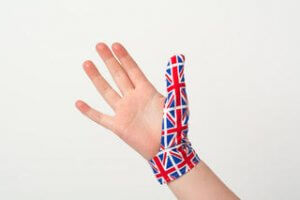We all have our own ways to relax. Some of us soothe themselves by listening to their favourite music or simply reading a book while enjoying a cup of coffee. The same psychology applies to our kids as well. And they find their own unique ways of relaxing. Thumb-sucking is one such habit that is seen in kids. The majority of babies suck their thumbs mostly when they are tired, bored, or in need of comfort. They enjoy sucking their thumbs and find it a form of entertainment. Then comes newborn thumb sucking where babies simply continue a habit they learned while still in the womb. Yes, some babies learn this habit inside the womb only. For some newborns, the discovery of their thumb begins within weeks of birth. The urge of sucking the thumb usually decreases after the age of 6 months. But many babies continue to suck their thumbs to soothe themselves until very late. This habit can even go beyond toddlerhood.
I have seen one of my nephews sucking his thumb until he was 4 years old. Thumb sucking was his routine activity when going to sleep and after waking up. Initially, we used to smile at his habit. Then slowly we started getting concerned about his addiction as he was close to 4 and he still preferred thumb-sucking over toys. My sister-in-law started scolding him every time she found him sucking his thumb but he never cared about her words. Then she started searching for how to stop thumb sucking and tried many other home remedies like applying chilly, Neem oil and even nail polish on his thumb. But nothing worked for him.
Generally, there are a couple of reasons why do children suck their thumb or finger. Many little ones pick this thumb finger sucking habit when they are trying to find a substitute for sucking on a bottle. The act of sucking calms down the baby. Even when they just finished the feed, they continue sucking their thumbs until they fall asleep. While for some babies, this habit goes automatically with time, some show a clear indication of obsessive thumb sucking. And once a kid begins thumb-sucking, it may be a difficult habit to quit; they get so used to sucking their thumb while watching TV or sitting quietly or falling asleep that they can’t stop.
Prolonged thumb sucking may affect their teeth. It can push the teeth outward or cause misalignment. It can also lead to speech problems, such as lisping. If you are concerned about your toddler’s thumb-sucking, here are some strategies for how to stop thumb sucking:
How to Stop Thumb Sucking in Kids:
Dive into our expert tips and tricks below to discover effective strategies for how to stop thumb sucking.
1. Don’t Force:
Toddlers never like being forced into anything. So, avoid continuous scolding. This can let the kid develop a habit of avoiding you. And he/she would suck the thumb secretly.
2. Avoid Home Remedies:
3. Talk to your kid:
Let your kid lovingly know that this is a bad habit. How it can let germs reach inside the mouth and lead to an infection. If needed, take him/her to a dentist and with pictures of damaged teeth, you can explain to him/her that thumb sucking can do this as well.
4. Encourage your child:
If you caught your child sucking the thumb and he/she stops doing it once you give the soft hint of not doing it, then appreciate your child. Give your child a substitute for thumbs like his favourite toy or a book. Little materialistic appreciation can do wonders for young kids.
5. Look For The Stimulus:
While looking for easy ways to stop thumb sucking, it is always a good idea to look for the stimulants that trigger a response of thumb sucking in children. Once you identify the stimulus, you can manage that situation to stop thumb-sucking.
6. Praise Your Child
For every little effort that they make to quell their habit of thumb-sucking, you should praise your kid and provide them with positive reinforcement to keep up with those efforts.
7. Consult A Therapist
You can consult a child behavioural therapist or any other professional to guide you about the various ways in which you can handle this situation better. This will put things in perspective for you and your child and enable you to devise effective strategies to stop thumbsucking.
When Should I Intervene?
As a parent, you should seriously consider thumb-sucking prevention, when your child has reached a certain age. Most kids tend to let go of this habit, by the time they are 3 or 4. If your child refuses to do the same, you should consult a professional or adopt any of the above-mentioned ways to stop thumb-sucking. Moreover, if you start experiencing certain behavioural and speech changes in your child due to thumb-sucking, you should immediately address the issue.
What If Nothing Works?
In case you feel that you have hit a roadblock in terms of encouraging your child to stop thumb-sucking, you should approach this situation in a very calm and patient manner. This is because stress is palpable and your child will pick up any kind of tension.
Talk to a professional or a behavioural therapist to address and alleviate your concerns. Rest assured, that your child will outgrow this phase with your understanding and support.
Try Thumbsie® :
Thumbsie® has created a unique thumb-sucking glove to prevent the habit and problems with thumb-sucking. The product covers the thumb and acts as a constant reminder when they put their thumb in their mouth.
More about Thumbsie®
- It’s a fabric thumb guard that is handmade and fits over the thumb like a glove for the prevention of thumb-sucking in children. The glove is secured around the wrist using Velcro.
- The glove is made of 100% cotton fabric that can be easily washed. It comes in 5 different sizes. It also has a simple measuring guide, which helps them to fit well.
- There are over 30 different fabrics to choose from, such as small animal fabrics, flowers, butterflies, camouflage, little army men, cars and robots. All such patterns that kids mostly like.
- Suited to children aged 3 – 12 years, they can wear it all the time. When they are playing, writing or doing any other activity. Once the child has stopped sucking a personalized certificate is offered free of charge to make the child proud and feel special.

Effectiveness of Thumbsie® Glove
Thumbsie® is a well-known name in the UK. Thumbsie® is the only website in the UK dedicated to helping children to stop thumb and finger sucking. It is seen that with Thumbsie®, kids have stopped thumb-sucking within a few days. Although some kids took a little longer with Thumbsie® all the time, day and night, they quit the habit without any pressure. There are many success stories shared by parents who tried Thumbsie® Glove for their kids. You can even find a dentist recommending Thumbsie® Glove as he himself found that it actually works.

Where to buy Thumbsie® Glove
Order from their website. You can choose from two options: Thumb Guard for toddlers and Finger Guard for toddlers. Select the fabric that your kid may like the most and shop it online with no hassle. Please use the code BMT for getting 10% OFF at checkout.

Complete Thumb Sucking help
Thumbsie® website not only make their product available, they also have a great quality content around thumb sucking. Why kids suck their thumb, Tips to prevent thumb sucking and personal stories of parents. You can also find pros and cons of different nasty remedies that people recommend for thumb sucking child. For me, it was an eye-opener.
My Take on Thumbsie®

As it doesn’t cover all the hands it allows full movement, which means it does not restrict the child’s ability to play or cause any discomfort. Moreover, it never makes the kid feel punished for something which he/she hardly accepts as something wrong. However, as parents, you really want your kids to get rid of this as soon as possible. So, if you see that your child is reluctant for quitting the habit of thumb or finger-sucking, you must try Thumbsie®. Its positive results are really promising.
Facebook: https://www.facebook.com/Jo.Thumbsie
Twitter: https://twitter.com/TheThumbsie
FAQs on Thumbsucking
1. What is the cause of thumbsucking?
The cause of thumbsucking in children and toddlers is a natural reflex that provides comfort and security. It is a self-soothing behaviour that helps them deal with stress, anxiety, and boredom. However, if the behaviour persists beyond the age of 4-5 years, it may indicate an underlying emotional or psychological issue that requires attention.
In some cases, thumbsucking may also be due to boredom, curiosity, or a desire for attention. To understand how to get rid of thumbsucking, various methods can be used such as positive reinforcement, distraction, and the use of thumb-sucking gloves, thumb guards for toddlers or finger guards for toddlers. Homemade thumb guards can also be made using simple materials to discourage the behaviour.
The thumbsucking in adults psychology/psychology of thumbsucking in adults
may be a sign of underlying issues such as anxiety, depression, or trauma. In such cases, seeking the help of a mental health professional is recommended to address the underlying issues and manage the behaviour.
2. Is thumbsucking good for babies?
Thumb sucking can serve as a positive experience for babies, given that it is a natural reflex that can provide them with ease. It can assist them in regulating their emotions by allowing them to self-soothe, and it can help alleviate stress and boredom. Nonetheless, it is essential to supervise the behaviour and ensure that it does not lead to any dental or speech problems.
3. What are the side effects of thumbsucking?
prolonged and intense thumbsucking can lead to some side effects. These include:
- Dental problems – Thumbsucking can cause misalignment of teeth and lead to an overbite or an open bite. It can also affect the development of the palate and cause speech problems.
- Skin problems – Constant moisture from thumbsucking can cause skin irritation, dryness, and chapping.
- Social stigma – Thumbsucking beyond a certain age can lead to social stigma and affect a child’s self-esteem and confidence.
- Infections – Thumbsucking can transfer germs and bacteria from the hands to the mouth, leading to infections and illnesses.
- Reduced fine motor skills – Prolonged thumbsucking can affect the development of fine motor skills, especially in the fingers and hand that is used for thumbsucking.
4. When does thumb sucking start?
Thumb sucking typically begins around the age of 0 to 6 months. It is a natural habit that babies use to comfort and self-soothe.
5. Is it normal for a 5 year old to put fingers in their mouth?
Yes, it is common for 5-year-olds to put their fingers in their mouth as a form of self-soothing. To avoid potential dental problems, gently encourage them to find other ways to comfort themselves as they get older.
6. When should thumbsucking stop?
Thumb sucking usually stops on its own between the ages of 2 and 4 years old as children develop new social skills. However, if thumb sucking continues after age 4 or begins to affect dental development, it is best to gently encourage your child to stop.
Happy Parenting!
- Home Remedies for Baby Hair removal - March 1, 2021
- How to Choose the Right Baby Skin Care Range - July 20, 2018
- Break off the habit of Thumb Sucking in your Kid - January 6, 2018
- How To Make Toddler Brush His Teeth - October 5, 2017
- 11 Tips for Traveling by Train During Pregnancy - July 17, 2017
- Few Tips for Normal Delivery - June 30, 2017
- Common Symptoms of Teething in Babies - June 9, 2017
- How To Put A Baby To Sleep - May 25, 2017
- Breastfeeding And Going Back To Work - May 17, 2017
- Why Mother’s Day - May 11, 2017
















